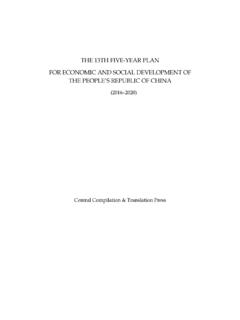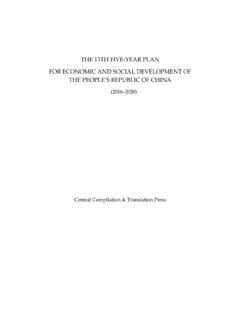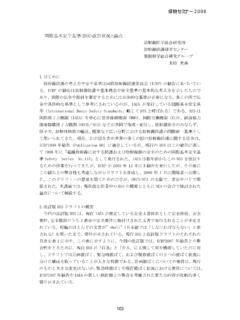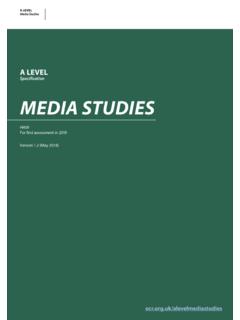Transcription of China’s Policies and Actions for
1 China s Policies and Actions for Addressing Climate Change 2017 National Development and Reform Commission China October 2017 100% printed on recycled paper Contents Foreword .. 1 I. Climate Change Mitigation .. 3 (I) Adjusting the Industrial Structure .. 3 (II) Conserving Energy and Improving Energy Efficiency .. 6 (III) Optimizing the Energy Structure .. 10 (IV) Controlling GHG Emissions from Non-Energy Activities .. 13 (V) Increasing Carbon Sinks .. 14 II. Climate Change Adaptation .. 16 (I) Improving Adaptation Capacity in Key Areas .. 16 (II) Enhancing Capacity Building .. 23 III. Local and Industry action and Social Participation .. 27 (I) Carrying Out Pilots and 27 (II) Local action for Addressing Climate Change.
2 30 (III) Low-Carbon action in Sectors .. 33 (IV) Broad Social Participation .. 36 VI. Planning Formulation and System Construction .. 41 (I) Strengthening Planning .. 41 (II) Improving Schemes and Mechanisms .. 43 (III) Enhancing Laws, Regulations and Standards .. 45 (IV) Enhancing Carbon Emission Trading System .. 47 (V) Boosting Green Low-Carbon Finance .. 49 V. Fundamental capacity building .. 51 (I) Improving GHG Statistical and Accounting System .. 51 (II) Enhancing Scientific and Technological Support .. 54 (III) Strengthening Personnel and Disciplinary Development .. 55 VI. Enhanced International Exchanges and Cooperation .. 57 (I) Promoting Exchanges and Cooperation with International Organizations.
3 57 (II) Strengthening Exchanges and Cooperation with Developed 58 (III) Deepening South-South Cooperation on Climate Change .. 59 VII. Active Involvement in Global Climate Governance .. 60 (I) Actively Promoting Multilateral Processes under the United Nations Framework .. 60 (II) Extensively Participating in Other Multilateral Processes .. 62 (III) China's Basic Position and Stance on COP23 .. 64 2017 1 Foreword Climate change is one of biggest challenges facing mankind in the 21st century. The Chinese Government has always attached great importance to tackling climate change and strengthened the work on low-carbon development and climate change adaptation since the beginning of 13th Five-Year Plan (FYP) period (2016-2020).
4 As an important part of the five-year plan for national economic and social development, the Work Plan for Controlling Greenhouse Gas Emissions During the 13th Five-Year Plan Period has been formulated and implemented. Regional governments formulated and decomposed greenhouse gases (GHG) controlling targets, ministries and departments implemented Policies and measures, sectors and enterprises took innovative Actions , and the public participated actively. Thanks to hard work, in 2016, the carbon intensity decreased by from the 2015 level and the proportion of non-fossil energy sources increased to The tasks for afforestation and forestry protection were overfulfilled, the capacity for climate change adaptation and disaster prevention and alleviation were further strengthened and the systems and mechanisms for addressing climate China s Policies and Actions for 2 Addressing Climate Change change were improved.
5 The carbon market construction is underway in an orderly manner and will be officially launched in 2017. Since 2016, China has continued the firm support of global climate governance process and been highly praised by the international community for the significant contribution to the conclusion and rapid entry into force of the Paris Agreement and the promotion of international cooperation in addressing climate change. This annual report has been hereby issued to enable all parties to fully understand China's Actions , Policies and accomplishments in addressing climate change from 2016 onwards. It is worth noting that the just-concluded 19th National Congress of Communist Party of China (CPC) raised higher requirements for addressing global climate change and promoting low-carbon development from the perspective of China and the world.
6 In the future, we will develop a green, low-carbon and circular economy, build a clean, safe, efficient and low-carbon energy system, advocate a simple, moderate, green and low-carbon lifestyle, accelerate the formation of green low-carbon new growth drivers, promote the improvement of development quality, actively fulfill the mitigation commitment, and achieve the nationally determined contributions as scheduled. We will work with all countries around the world to tackle climate change and protect the Earth! 2017 3 I. Climate Change Mitigation From 2016 onwards, the Chinese Government has achieved positive results in mitigating climate change through a series of proactive measures, including adjusting the industrial structure, conserving energy and improving energy efficiency, optimizing the energy structure, controlling greenhouse gas (GHG) emissions from non-energy activities, and increasing carbon sinks.
7 (I) Adjusting the Industrial Structure Boosting strategic emerging industries. The State Council issued the 13th Five-Year Plan for Strategic Emerging Industries, which laid down comprehensive arrangements for strategic emerging industries in the five years, including development objectives, key tasks and policy measures, as well as put forward to promoting green low-carbon industries as pillar industries such as new-energy vehicle, new energy as well asenergy conservation and environmental protection industries. The State Council unveiled the Guiding Opinions on Deepening the Integration of Manufacturing and the Internet, calling for aligning the "Made in China 2025" and "Internet Plus" plans.
8 The General Administration of Quality Supervision, Inspection and Quarantine (AQSIQ), Standardization China s Policies and Actions for 4 Addressing Climate Change Administration of China (SAC), and Ministry of Industry and Information Technology (MIIT) unveiled the Standardization and Quality Improvement Plan for Equipment Manufacturing Industry. MIIT released, together with the National Development and Reform Commission (NDRC), the Guidelines for Information Industry Development to promote the formation of an internationally competitive and safe information industry system. MIIT issued the Development Plan forSoftware and Information Technology Service Industry (2016-2020).
9 NDRC and MIIT released and implemented the Opinionson Improving Management of Automotive Investment Projects to boost the new-energy vehicleindustry while strictly controlling the increase of production capacity of traditional fuel vehicles. Proceeding withcapacity reduction of energy-intensive industries. The State Council has introduced multiple Policies and achieved significant results in cutting the capacity of energy-intensive industries since 2016. The State Council unveiled the Opinions on Reducing Overcapacity in the Steel Industry to Achieve Development by Solving the Difficulties, which required, in principle, to stop approving new coal projects, technological upgrading projects with added capacity, and capacity-expansion projects in three years from 2016 onwards, and where new mines are indeed needed, implement replacement at a reduced 2017 5 amount.
10 The State Council issued the Circular on the Catalog of Investment Projects Approved by the Government (2016), tightening the control of added capacity of such overcapacity industries as iron and steel, electrolytic aluminum, cement, plate glass, and shipbuilding. Efforts were continued to eliminate backward production capacity in steel and coal industries, which reduced the over production capacity of crude steel by more than 65 million tons and coal 290 million tons in 2016. Bolstering the service industry. In 2016, the service industry witnessed vigorous development and made greater contribution to the national economic growth.









